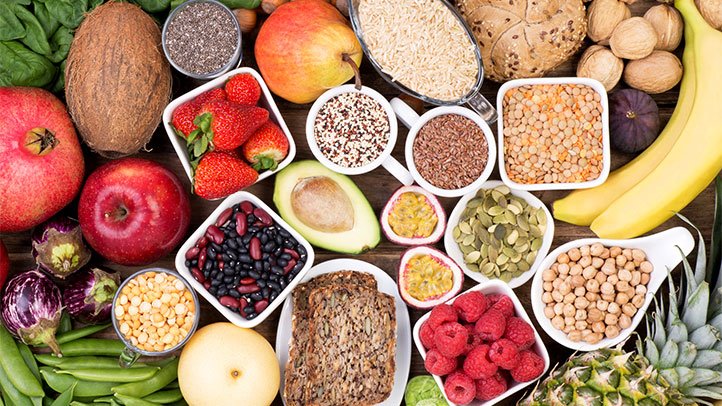This time of the year offers a ‘clean slate’ of fresh opportunities. People are motivated more so now than ever before and are willing to try anything that will shed a few kilos after the festival season. January typically brings a flood of clichés and crazy regimes; many of which being ‘diets’ or “fad diets” as we say it!
Many of us know that fad diets don’t work and are not sustainable over a long period of time, yet we feel as though we are the failure when we can’t stick to them. Creating good, bad, and easy habits can be addictive by nature, but when it comes to our nutrition and health, we should make sure that these habits are realistic, positive, and achievable long term. You may think that going on a no carbohydrate, gluten free, or seven-day detox diet will be the key to weight loss, but there is a reason that no Accredited Nutritionist or Dietician recommends these quick fixes.
Essentially, the only reason you should cut any foods from the five good groups out of your diet, is if you are intolerant to them. All foods from the five food groups provide nutritional value to our diet; it’s the quantity and frequency that we have the food that is a concern. To give you a little idea, I’ll outline a few diets that are hot topics in the Health and Fitness Industry today.
- Paleo – The Palaeolithic Diet, also known as, Primal, Caveman, and Stone Age Diet is derived from the ‘hunter-gatherer, ancestral lifestyle’ idea (Pitt, 2016). The focus here is on consuming whole, unprocessed foods such as, grass-fed meat, free range poultry, wild fish, vegetables, fruit, nuts, and seeds (Pitt, 2016). Founder of The Paleo Diet, Dr. Loran Corain, says that avoiding grains, legumes, refined sugars, and dairy controls insulin sensitivity, repairs gut health, and increases nutrition absorption (Pitt, 2016).
- Keto – The Ketogenic Diet adopts the concept of a low carbohydrate intake and instead, relies on dietary fat as a source of fuel (Swine, Vining, & Freeman, 1997). By lowering the intake of carbohydrates and training the body to use fat as fuel, the body is induced into a state known as Ketosis (Swine, 1997). Ketosis is a natural process the body initiates to help you survive when food intake is low (Swine, 1997). During this state, the body produces ketones which are formed from the breakdown of fats in the liver (Swine, 1997). The primary goal of Ketosis is to force the body into a metabolic state. A typical keto diet includes; meat, above ground vegetables, full fat dairy, nuts, seeds, avocados, and berries. Foods to avoid include; grains, sugars, most fruits and some vegetables.
- Pescatarian – The Pescatarian Diet approach avoids all meat and animal flesh food products (Axelrod & Fuerch, 1998). This style of eating follows the basis of a vegetarian diet with the addition of fish and some other seafood such as prawns, crabs, lobster, etc. (Axelrod & Fuerch, 1998).
- HCLF Vegan – The High Carbohydrate Low Fat Vegan Diet also known as the 80/10/10, is where a person’s diet consists of 80% carbohydrates, mainly from fruit, vegetables, grains, and beans, 10% fat from avocado and oils, and 10% protein from plant-based sources of protein (McDougall, 2004). Those that choose this style of eating are said to have improved digestion, increased energy and weight loss (McDougall, 2004).
- Intermittent Fasting – the latest craze! Intermittent Fasting is a diet where you fast, a.k.a. not eat, for a certain amount of time before eating again. The most popular form of fasting is the 16/8 approach, whereby you fast for 16 hours of the day, and then allow yourself to eat whatever you want for the next 8 hours. This style of eating is supposed to promote a stronger insulin sensitivity and increase growth hormone secretion – two key factors for weight loss and muscle mass.
These fad diets provide many short-term benefits but are difficult to sustain and may cause health problems in the future. As a general rule, dieticians and nutritionists suggest that you eat a well healthy and balanced diet and exercise regularly.
Stop overthinking it.
Eat moderately well.
Workout a few times a week.
Get enough sleep.
Repeat forever.
References:
Pitt, C.E. (2016). Cutting through the paleo hype: the evidence for the Palaeolithic diet. Australian Family Physician. 45(1/2), 35-38.
Swine, T.D, Vining, E.P., & Freeman, J.M. (1997). The ketogenic diet. Advances in Paediatrics. 44(2), 297-329.
Axelrod, P., & Fuerch, M.A. (1998). Pescatarian diet discussed. Ethnohistory. 45(3), 439.
McDougall, J., Bruce, B., Spiller, G., Westerdahl, J., & McDougall, M. (2004). Effects of a very low-fat, vegan diet in subjects with rheumatoid arthritis. The Journal of Alternative and Complementary Medicine. 8(1), 71-75.
Mattson, M., & Wan, R. (2004). Beneficial effects of intermittent fasting and calorie restriction on the cardiovascular and cerebrovascular systems. The Journal of Nutritional Biochemistry. 16(3), 129-137.




